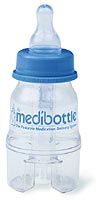 Clinical Study & Trial Overview
Clinical Study & Trial Overview
 I. A three part, open-label, randomized, cross-over study comparing Effectiveness and Infant Acceptance of the medibottle vs. Oral Syringe (Dispenser) at The University of Illinois at Chicago found that the medibottle measured 93.3% Effective vs. oral syringe at 56.7%. Also, medibottle's Ideal Infant Acceptance measured 329% greater than for the Oral Syringe.
I. A three part, open-label, randomized, cross-over study comparing Effectiveness and Infant Acceptance of the medibottle vs. Oral Syringe (Dispenser) at The University of Illinois at Chicago found that the medibottle measured 93.3% Effective vs. oral syringe at 56.7%. Also, medibottle's Ideal Infant Acceptance measured 329% greater than for the Oral Syringe.
Outcomes Measure: Effectiveness equals percent of infants receiving 100% of intended dose. Ideal infant acceptance equals MAS score of 9 or greater (McNemar test). Conclusion: "medibottle was significantly more effective and had a significantly higher level of infant acceptance compared to the oral medication syringe."
Part III was published in The Journal of Pediatric Pharmacy Practice (PPAG) and the Report, "Infant acceptance and effectiveness of a new oral liquid medication delivery system" was published in American Society of Health-System Pharmacists in June of 1999. *Please see footnotes.
* Footnotes: The following two comments are made solely by the manufacturer, The Medicine Bottle Company, and not DM Kraus, LA Stohlmeyer, PR Hannon or UIC. First, Acetaminophen is not generally considered to be bad tasting medicine. Effectiveness and acceptance measures for bad tasting medications administered with the oral syringe can be expected to decrease. Secondly, the medibottle functions best when familiar nipple/liquid used and especially so when infant is hungry. Time of administration was random and not likely to have been during the infant's normal feeding time. Additionally, the nipple and liquid were standardized and not necessarily familiar to the infant. For these reasons, effectiveness and acceptance measures for the medibottle can be expected to increase when medicine is administered using a familiar nipple and liquid, especially when the medibottle is used during normal feeding times.
II. Children's Memorial Hospital in Chicago enrolled 10 infant patients under the age of 18 months that required chloral hydrate for sedation in their clinic. The RN who administered the drug with 15-30cc's of a clear liquid to the infants wrote, "… because of the bitter taste, I frequently have to restrain the children in order to give the full amount of medication. All ten of the children took the full dose of medication using the medibottle as instructed in the medibottle brochure (with "little squirts"). They not only took the full dose of medication but they took it willingly. If you have ever given chloral hydrate you know this is quite a feat!
It should be noted that five of the ten children had received chloral hydrate in the past and previously required a restraining technique. The parents of these five children, in particular, were very impressed with the medibottle. They were able to see the difference in the child's response to receiving medication."
In summary the RN stated, "the medibottle is a highly effective way to administer medication to infants who will drink from a bottle. The restraining technique that was used on the infants previously did not have to be utilized when the infants received the chloral hydrate via the medibottle. The medication had been delivered with ease and accuracy therefore allowing that child to complete remainder of the tests."






